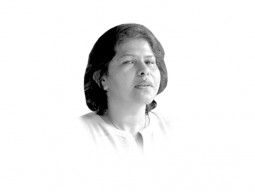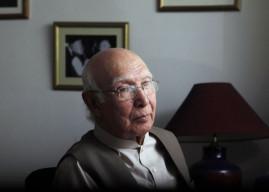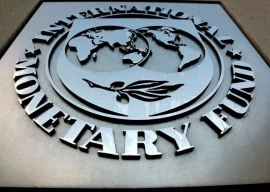
What do the Taliban really want and why is it not easy for Pakistan to fight them? The Associated Press carried an article on December 17: "Peshawar Terror attack: What does Pakistan Taliban want?"
Answering the question, the report said: "The TTP has vowed to overthrow the government and install a harsh form of Islamic law."
On CNN, Laura Smith-Spark and Tim Lister ("What do the Taliban want?") reported: "When the siege finally ended, Pakistan was left reeling and the world wondering: Who would do such a thing? And what do they hope to achieve? The identity of the group behind the massacre at the army-run school in Peshawar is no mystery. The Pakistan Taliban — who have long conducted an insurgency against the Pakistani government as they seek to overthrow the authorities and bring in Sharia law — were quick to claim the terror attack."
James Rush wrote in The Independent ("Who are the Taliban and what do they want?"): "The Pakistani Taliban have been fighting to topple the government and set up a strict Islamic state. Following a major army operation against insurgents in tribal areas, the group has vowed to step up its attacks."
This same question has long been asked in the English press. Hamida Ghafour reporting for The National in 2010 ("What do the Taliban really want?") wrote about the Afghan Taliban: "But who are the Taliban, and what do they want? Zabiullah Mujahid, a spokesman for Mullah Omar, the one-eyed leader of the Afghan Taliban, said in an interview with CNN last year: "We ask from the beginning and we say once again: to enforce the sharia law and Islamic government in Afghanistan, to remove foreign forces from our country."
Arthur Bright in the Christian Science Monitor in 2012 ("Who are the Taliban and what do they want?") quoted an expert saying this of the Taliban's funding: "A large majority ... is thought to derive from wealthy individuals living in Arab Gulf states ... Insurgents may also use the Hajj — the Muslim pilgrimage to Mecca — as a time to raise funds. These ties to Gulf-based militants may account for al Qaeda's influence over some groups."
Two things are obvious. First, what the Taliban really want is Shariah law and two, they are not a wild and isolated group but one with proper financing. The question is why they make that demand. The answer is in the law. The Pakistani Constitution's Article 227 (Islamic Provisions, Part IX) reads: "(1) All existing laws shall be brought in conformity with the Injunctions of Islam as laid down in the Holy Quran and Sunnah, in this Part referred to as the Injunctions of Islam, and no law shall be enacted which is repugnant to such Injunctions."
This commitment is clear and unambiguous. It comes from a promise in 1949 made by Pakistan's Constituent Assembly under Jinnah's successor, Liaquat Ali Khan. That text, the Objectives Resolution, reads: "Whereas sovereignty over the entire Universe belongs to Almighty Allah alone, and the authority to be exercised by the people of Pakistan within the limits prescribed by Him is a sacred trust;
And whereas it is the will of the people of Pakistan to establish an order: Wherein the State shall exercise its powers and authority through the chosen representatives of the people; Wherein the principles of democracy, freedom, equality, tolerance and social justice, as enunciated by Islam, shall be fully observed; Wherein the Muslims shall be enabled to order their lives in the individual and collective spheres in accordance with the teachings and requirements of Islam as set out in the Holy Quran and Sunnah."
Despite this, Pakistan's laws are mostly the same as secular India's, which in turn are mostly the same as the colonial British under Macaulay had written them in the mid-19th century. In the 1980s, President Ziaul Haq introduced some Islamic laws. This included such things as lashing people caught with alcohol, and laws on rape and on blood money. Many of these laws are on the book but not really put into practice because the Pakistani state is unwilling to turn the clock back. The analyst Khaled Ahmed calls Pakistan an incompletely Islamised state. Meaning that the promise of full Shariah has been withheld, leading to a lack of clarity exploited by the Taliban.
To answer the question that analysts have been scratching their head over: what the Taliban really want is implementation of Pakistan's Constitution. That is why it is difficult to fight them — because they say they are right on the question of law. No fight against them will succeed, or can even be properly started, unless the confusion over the Constitution and its promise is resolved.
Published in The Express Tribune, December 21st, 2014.
Like Opinion & Editorial on Facebook, follow @ETOpEd on Twitter to receive all updates on all our daily pieces.
COMMENTS (28)
Comments are moderated and generally will be posted if they are on-topic and not abusive.
For more information, please see our Comments FAQ












































Akbar saab just see who are the TTP people and than talk about them. They are just few uneducated and from some specific areas where they don't have any earnings etc so they are using religion etc to keep their livelihoods. Please don't spread confusion . pak will handle them.
@Bewildered: you seem to have an unhealthy level of faith in wikipedia. Take care else You will be disappointed. Do you realise even you & I can re-write/edit parts of it giving citations from highly biased articles/books?
@BruteForce: You Indians never tire of spewing your hatred against our leaders do you. Truly shameful that you would compare our Quaid who struggled for Muslim rights democratically with such barbarians. Hope you educate yourself.
Modi was banned from entering the US for god knows how many years on "terrorism charges" - please google it and you'll get several state department links verifying thr above statement.
So if he can become an apparently good leader after being a terrorist then we should have hope for Pakistan as well.
(Dear Mod: I should be given the right to respond to a directly asked question. I assure you nothing in my response is unpolite or agaist the facts.)
@Benam:
"Would you care to do the same for Afghanistan Taliban, J-e-M and other terrorist groups?"
Last time I checked wikipedia.com, it was INDIA behind most of the terrorist and secessionist oufits in South Asia. Whether it was Mukti Bahini in East Pakistan, or LTTE, TELO, EPRFL etc. in Sri Lanka. All were not only trained by India's RAW, but also were fully financed, armed, and provided with logistics and intelligence by the Indian agencies. This is also the case with the host of Baloch terrorist/separatist groups, e.g. BLA, BRA etc., induldged in terrorist and sabotage activities in Pakistan. Keeping India's history in mind, why would India not also sponsor TTP, providing them support via Afghanistan, as they are the most leathal ones harming Pakistan the most?
Now I come to Pakistan's role. Pakistan helped Afghan Taliban, but only after 1) the Afghan warlords failed to reconcile and form a stable government in Kabul, 2) they destroyed much of the already ruined Afghanistan in their war against each other which did not allow the return of 3.5 million Afghan refugees living in Pakistan causing socio-economic problems here, 3) the West and the rest totally abandoned Afghanistan after Russian retreat, and all the efforts of Pakistan to bring the Afghan warlords together failed. Nawaz Sharif took all the leaders of the waring factions to Mecca where they sworn on Koran in Kaaba not to fight each other, but no sooner than they returned, they started fighting again.
If someone still blames Pakistan for supporting Taliban, who not only established peace and writ of Kabul in most parts of the country for the first time in history, but also controlled the poppy cultivation and opium production, a basic ingredient of 'heroin' of which Pakistanis were the first victims, then he/she can keep blaming, but at the cost of his/her own conscience. Pakistan never condoned Taliban's religious intollerance or treating women in medieval manners, rather always raised voice against that.
As for as JeM and other Kashmiri groups fighting for their freedom, Pakistan will always support them no matter what you call them (Britishers also called Bhagat Singh and Chandra Bose terrorists), until India gives them their demoratic right of self-determination as promised to them by India and reafirmed by UNSC.
The question is what do you want from the Taliban. Or what do you want from yourself. See you are the Taliban.
@numbersnumbers:
"More delusions of denial!!!!!!"
In this "Internet/Information Age", ignorance is a crime, not a bliss. Spend some time on reliable and authentic websites -- e.g. wikipedia.com for a start and follow from there the reference section of the topic -- and study history of the region before commenting on issues about which you have no clue.
@Prfaul R Shah, Please stop this name calling and personal attack. Just because author has an opinion and you do not agree with him, should he leave India? What kind of argument is that. Even if someone is undermining the idea of India in this case, its you. No one will miss you either, if you dont have a better argument.
@Bewildered: More delusions of denial!!!!!!
@Bewildered:
It is great that you did this thorough and fact filled analysis of TTP.
Would you care to do the same for Afghanistan Taliban, J-e-M and other terrorist groups? Let's see how much more fact twisting you can do to avoid looking at the truth.
No Modi bashing???? Aakar Patel disappoints...
Sorry Aakar the Taliban don't want Islam or Sharia ( don't get fooled ) ALL THEY WANT IS POWER. They see a State with very bad governance, corrupt politicians, a complete break down of the legal system, a hypocritical religious system, an army that kept sitting on the fence with the ' not on my watch ' mantra ( except now we see a direction after 132 children were heinously murdered ), rampant corruption all around AND WEAK COMPROMISED POLITICAL leadership. In short the Tliban are like corporate raiders...they see a vacuum and are trying to exploit it...........religion is the vehicle they are using.
@Dipak: The author lives in India where he enjoys all benefit of Indian law and privileges. It easy for him to say anything about India including telling India is low trust society. Let him find better place in the world. India will not miss him.
Here a my thoughts about TTP presented succinctly. 1- 99.9% laws in Pakistan are not against any Islamic injunctions. 2- TTP terrorists are only a bunch of criminals whose acts are neither Islamic nor human. Not a single religious scholar of repute is among them. Look at their Ameers (Hakim Mehsood e.g.) and commanders. 3- TTP is using religion as a cover for their criminal and terrorist activities for getting riches and power. 4- TTP was created and is funded, armed, and given logistics by RAW, CIA, and NDS. 5- The objectives of the TTP masters are various, but primary is to weaken the state of Pakistan. CIA supported them because they wanted Pakistan to abandon Afghan Taliban. RAW to hurt and stop Pakistan supporting Kashmir cause. NDS to get dollars both from RAW and CIA.
@Mansoor: Truth hurts. Isn't it my dear ?
It is Q.E.D. What the terrorists want. Two givens. Shariah and a brutal barbaric regime. Which their Khawariji Philosophy dictates. They tried this in Swat, Pakistan and failed. Because the population started to leave, migrate to other areas. Sure, the Pakistan Army stepped in and cleaned them out. After a brutal campaign. However, this cannot be disregarded, the Afghan faction of TTP is aided and abetted by an "Eastern Neighbor" Same goes for Balochistan. Even the 'Dehati Aurats' can tell you this. This not mulla talk or Hamid Gul talk.
Stick to writing about Modi. Why change career midway?
Absolutely. And, remember Jinnah too has stated Sharia be the basis of Pakistan's Constitution.
So, TTP are doing what Jinnah had stated several times in his speeches, using the methods employed by Jinnah.
So are you saying that they pretty much want the Pakistani constitution to be implemented?
Come on Aakar, you don't know what you are talking about. It's the religion that has kept Pakistan in StoneAge. The average Pakistani wants a religion free governance free of Feudal, Military and Mullah. The Taliban are the creatures that were created to fight Afghan war against Russians, nothing more. Pakistan created them for their financial gain to run their country with US money. It's true that Middle East countries want those stupid sharia laws(?) in Pakistan and Afghanistan just to keep them in StoneAge, but it will never work.
Good luck to the people of Pakistan and their Constitution’s Article 227 (Islamic Provisions, Part IX) ... India must redouble its investments and efforts to insulate India from the turbulence from across the borders in Pakistan ... !!
This article pretty much questions the core ideology that led to creation of Pakistan.
"No fight against taliban will succeed, or can even be properly started, unless the confusion over the Constitution and its promise is resolved." Pakistan state has lot of problems that it has yet to address, it is busy defining which is the right Islam to follow either be Islamic or Muslim country, another contradiction islam as an identity or ethinicity as an identity(Sindi, Panjabi, Balotch, Pashtun etc.) and is thus most virulent against its own Muslim sects (Sunni, Shia, Ahmadiyya, Bahai, etc) just as ISIS is busy trying to eliminate Shias in its fledgling caliphate and the Saudi royalty follows its own extreme version of Islam where they may even end up vandalizing their own prophet's grave. India was spared a hindu theocracy by partition. time to save out aloud: "thank god for partition." thank god we did not get our akhand bharat - which even sanghi ideologists do not stop fantasizing about.
'...they want to impose Shariah law...' True, and the whole world knows The author hits the bull's eye. Second '...have proper financing...' now that is debatable. No doubt there is 'rich individuals financing' but not all. With all due respects the TTP is using Karachi as an ATM machine. Large swathes of Karachi are under their control. And their activities involve gun running, smuggling, bank robberies, ransom kidnapping, land grabbing, land mafia, drug smuggling, drug peddling, target killing, car jacking, home invasion robberies. and 200 other nefarious activities. However one thing is crystal clear. With no doubt. In the past Bharat was involved with the Afghan and Balochistan factions of TTP.
I disagree.The taliban are against the democratic process itself.THey dont really care about the constitution.
1- 99.9% of laws in Pakistan are not against Islamic teachings. 2- TTP terrorists are a bunch of criminals whose acts are neither Islamic nor human. 3- TTP is using religion as a cover for their criminal and terrorist activities. 4- TTP is funded, armed, and given logistics by RAW, CIA, and NDS. 5- The objectives of TTP masters is to weaken the state of Pakistan.
very well said it but no one wanna litsen the truth.